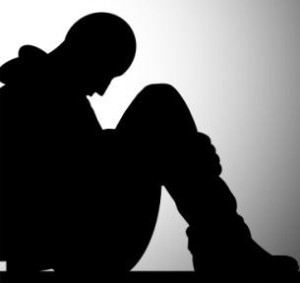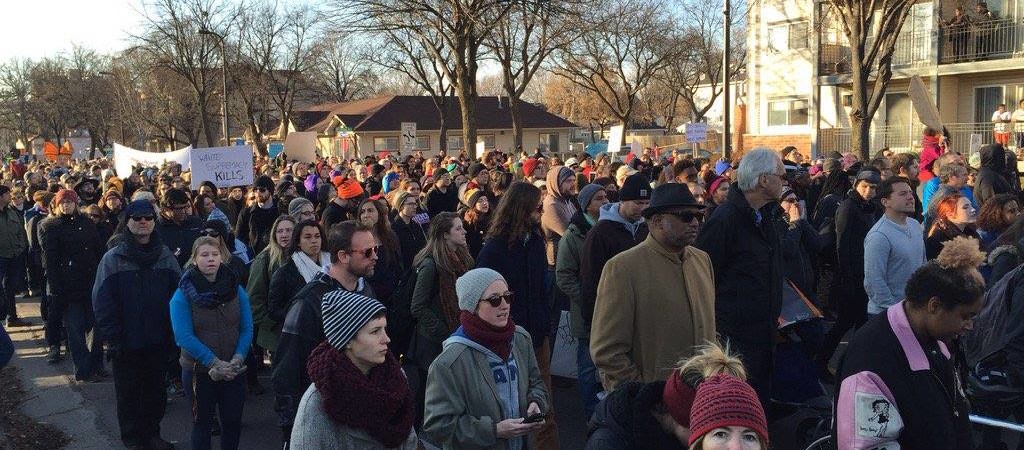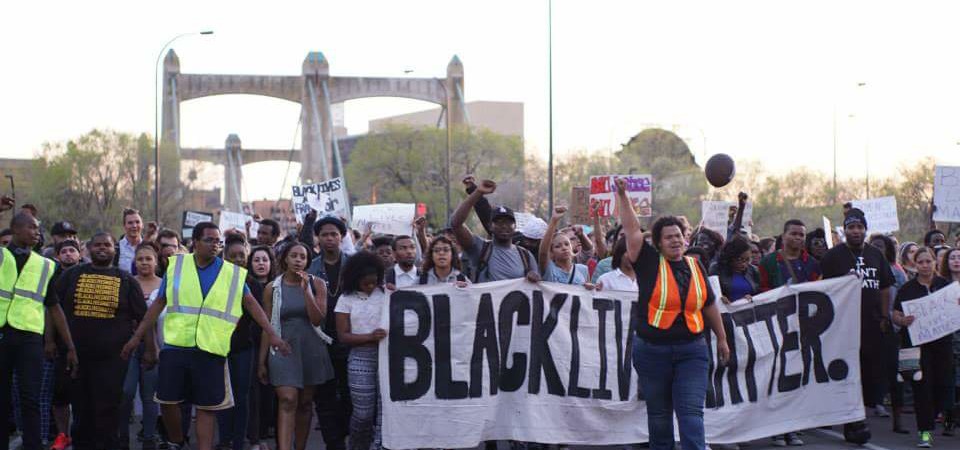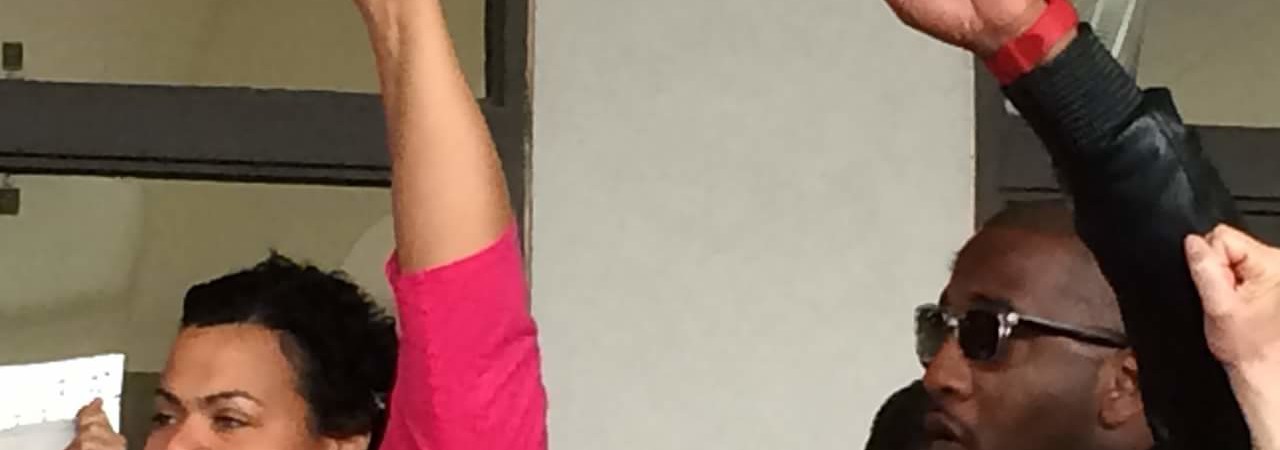LenaGardner
Impatient with Waiting
December 1, 2016Podcast: Download (Duration: 0:47 — 750.6KB)
Subscribe: More
Because of advances in technology, our world literally moves faster than ever. Read more →
Cultivating the Courage to Act
April 1, 2016Podcast: Download (Duration: 0:31 — 493.9KB)
Subscribe: More
Read more →Freedom lies in being bold. —Robert Frost
The Hope of Our Ancestors
December 1, 2015Podcast: Download (Duration: 16:44 — 15.3MB)
Subscribe: More
 This piece was originally presented at a #BlackLivesMatter vigil at the First Universalist Church of Minneapolis.
This piece was originally presented at a #BlackLivesMatter vigil at the First Universalist Church of Minneapolis.
My heart is aching for answers, for a way this makes sense, for a way to understand a 12-year old child shot, a way to understand Eric Garner, a father of six, choked to death in broad daylight with his murderers caught on camera—no medical attention, left to die in the street just like Michael Brown, who also received no medical attention. Read more →
A Black Lives Matter Sermon
November 24, 2015This sermon was delivered at the Michael Servetus Unitarian Society in Fridley, Minn. on Sunday morning, the 15th of November 2015, as Jamar Clark lay in hospital fighting for his life, shot by Minneapolis police. It was written in the wake of the deadly terrorist attacks in Paris, France; in Beirut, Lebanon; and Baghdad, Iraq. We share it with you the day after Lena spent most of the night at the camp at the 4th Precinct in Minneapolis dealing with the aftermath of a terrorist attack launched by white supremacists on the people participating in the occupation and calling for justice in the shooting death of Jamar Clark.
Read more →
The Coming WORR: A Week of Righteous Resistance July 12 – 18
July 8, 2015Last November, I lay down with just under a hundred other people on an interstate highway in Minneapolis. Along with thousands in cities across the country, we stopped the cars, we carried signs and we chanted and sang, saying Black Lives Matter in every way that we could. My brother called me from Texas, and said, “Hey, did you shut down I-35 today?” I responded, “Well, yes, me and a few others.” He said, “It made news down here. That’s dope. My freedom fighter sister.” That was just over six months ago, it was the start of what has been a nonstop whirlwind of actions, public witness, and personal challenges for me. Read more →
Selma 2015: 50 Years After The March
March 6, 2015Wednesday 3/4/15
It’s the day before I will travel to Selma, Alabama with over 60 UUs and community members from Unity Unitarian Church in St. Paul, Minnesota for a pilgrimage to the historic Edmund Pettus Bridge. This year marks the 50th anniversary of “Bloody Sunday,” when 600 civil rights marchers were brutally attacked by local police forces in Alabama. There are many resources available for folks to educate themselves about what happened and why it happened, and how it changed the arch of this nation’s history in profound ways.
What I carry in my heart 50 years later as I venture south, and as part of the current Black Lives Matters movement, is a knot of fear, respect, and anticipation. On some sides of my family I am 4th generation Minnesotan. I am a northern girl, raised in an middle-class Black family in the suburbs. I was taught to fear the South because of the racial tensions, bias, and potential for violence that it still holds for Black people of all shades. Part of me holds that fear, and wonders if I will do something unknowingly, make some cultural misstep that will put me in either real or just danger of embarrassment. More than that, and through the fear, I am hopeful to learn more about the history of my own people. I want to learn more about the people who changed the direction of this country and find more ways to continue the work we still have yet before us.
Thursday 3/5/2015
I currently sit on a plane headed south. The end destination is Selma, Alabama to celebrate the 50th anniversary of the Selma march which, among many other things, ushered in the passing of the Voting Rights Act.
There are many emotions that are going through me as I sit and prepare for the conference, and for new experiences and new relationships. Last night when I took three of my nieces to a performance of a family friend, all three of my nieces made comments about their hair. They were all embarrassed or felt self-conscious of their hair at one point or another. I literally felt pain in my heart as one of them turned to me and said, “Look Auntie! Two of them have locks too!” The look in her eye was one of pride and acceptance, but what was beneath was a feeling of otherness and ugliness that I know she feels in other settings.
My other niece took off her hat, and she said” Auntie, do you like my hair? “ I said, “I love your hair, sweet one.” I touched her beautiful wool-like hair and she nearly purred with pleasure. She said, “My hair is so nappy, I don’t like it sometimes.” I felt my heart ache, I didn’t have magic words for her, I just comforted her and pulled her close to me. As I sank my hand over her hair and just poured love into her, she smiled at me.
What I can’t shake is the feeling that the self-hatred starts so young as a Black woman. When I was their age, I remember wishing that my hair was nappy because it would have meant less teasing all around from blacks and whites.
Fundamentally, underneath all of the structural forms of racism, like voting discrimination, is the idea of white supremacy and the continued refusal to recognize the full humanity of Black people. When I see this mentality really starting to grab hold of the consciousness of my beautiful, vibrant, loving nieces my heart breaks in a new kind of way. I want this world to be different. I don’t want them to hate themselves or their bodies or their hair. I want them to be able to see themselves as I see them, as perfect, as loved, as worthy of their full humanity.
To go into the South is to confront and get closer to and experience the roots of these historic oppressions against my people. I don’t know what it will mean for my heart ache. But I am turning toward the past. Turning toward the ugliness so that I may be informed by it to build a better world for my neices and the children I some day hope to have.
Thursday 3/5/2015 PM Update
I am exhausted after a three hour long soul-stirring memorial church service at Tabernacle Baptist Church. We heard stories from civil rights leaders who were there, in that same building, with Dr. King and other leaders, as they began the agitation campaign that would change the course of history.
We attended this event after hearing from Joanne Bland, a child at the time, who marched in Bloody Sunday and the march afterward to Montgomery. Hearing Joanne talk about this and what it meant to her was profound. All I have to say is I felt fear melting away from my heart because of what she faced. She talked about not wanting freedom any more after being beaten on Bloody Sunday. She talked about being scared, but trusting in her older sisters that the next time they marched they wouldn’t be beaten. She also talked about how for the next 36 years they still spent trying to get their votes counted. Because here is the catch that they don’t tell you in the story–even though they were allowed to register to vote, the same people who ordered their beatings on Bloody Sunday were in charge of “counting” their votes now. As she said, they came up with a funny way of counting. 36 years.
The worship service was epic. All I can say is that I will write more to come about each keynote speaker, but that every single one talked about how we need to keep building the #BlackLivesMatter movement. At the end I found myself shaken to the core about the power in the blood. Dr. Barber from the NAACP talked about the power in the blood. Of both Christ and the civil rights martyrs: Dr. King, Viola Luizzo, Rev. James Reeb, Medgar Evers, Malcolm X. As a UU, I don’t necessarily subscribe to the traditional theology of Jesus, but I know this: I felt something stir in my soul last night that has never been kindled in that way before. There is power in the blood. There is. It’s the blood of my ancestors and those working in solidarity with them, and there is no way to get around the fact that it’s through their blood that I am able to live my life. There is power in the blood.
Friday 3/6/2015
I just got back from visiting the 16th Street Baptist Church and Kelly Ingram Park. As well as hearing from Gwen Gamble, we heard from the daughter of the minister of the church (at the time it was bombed) Barbara Cross. The church was bombed on Sept. 15, 1963. It is hard to describe in words how I feel right now or I felt standing at the site of the explosion listening to Barbara talk about being in the church at 13 years old. About her experience as part of the Children’s Crusades.
One of the things that struck me both about listening to Gwen and Barbara was how they talked about their faith. They were scared yes, but their faith carried them through and their singing. Their singing gave them strength. I walked past the fire hydrant where the fire fighters used to hook up their hoses and spray children as they came out of Sunday school. They were unafraid because they believed in a higher power and were grounded in love.
I never knew the four girls that were killed were in Sunday school classes. The lesson that day was about “A Love that Forgives.” As Barbara said, no one imagined just how deeply the church community would need to embrace that message in the wake of the bombing. She had us repeat the names of the children and then the quote that is printed on their memorial. She has repeat the word love four times, once for each girl that lost her life.
I am struck thinking about what grounds our work for racial justice today? If it isn’t God and Jesus and an unshakeable faith that makes us fearless in the face of death and bodily destruction and torture? What songs pull us into love?
Mostly, I want to learn to love like Barbara and Gwen. I want to learn to love powerfully. When I think about those girls, when I see the statues of the busts of the police dogs, when I hear about the KKK beating Gwen, or Barbara talking about walking out of the church after the explosion – I feel my heart breaking in new ways…and soon thereafter a smoldering rage floods in. Racism feels too small of a word, too small of a concept. Perhaps like Rev. Dr. Barber preached about last night we need to call it what it is: evil. For someone like me, it’s always been hard to get my mind around something like that. But the more I study the past, the more I hear from my people whose words I trust more than any textbook, the more I believe in evil.
And the more I believe in the power of love.
I used to hear my Grandpa quote Ephesians 6:10-18. I never truly got it or understood it. For those unfamiliar, this is what it says:
Finally, be strong in the Lord and in his mighty power. 11 Put on the full armor of God, so that you can take your stand against the devil’s schemes. 12 For our struggle is not against flesh and blood,but against the rulers, against the authorities, against the powers of this dark world and against the spiritual forces of evil in the heavenly realms. 13Therefore put on the full armor of God, so that when the day of evil comes, you may be able to stand your ground, and after you have done everything, to stand. 14 Stand firm then, with the belt of truth buckled around your waist, with the breastplate of righteousness in place, 15 and with your feet fitted with the readiness that comes from the gospel of peace.16 In addition to all this, take up the shield of faith, with which you can extinguish all the flaming arrows of the evil one.17 Take the helmet of salvation and the sword of the Spirit, which is the word of God. 18 And pray in the Spirit on all occasions with all kinds of prayers and requests. With this in mind, be alert and always keep on praying for all the Lord’s people.
Take up the shield of faith, with which you can extinguish all the flaming arrows of the evil one. Take the helmet of salvation and the sword of the Spirit, which is the word of God.
These words have new dimension to me. As a UU these words mean something different theologically to me than for many Christians, but I understand them differently and they have new meaning…no, that’s not totally true- they have meaning to me now: for the first time.
I am taking up my shield of faith.
The Intersections of Privilege
May 8, 2012I shaved my head with a Bic razor when I turned 21 years old. I did it intentionally and as a ritual of sorts. I wanted to do something quasi-original for my 21st birthday (in addition to the partying, which to be certain, I did as well).
Though shaving your head isn’t that original, deciding to do it completely sober as ritual of reaching a milestone in our culture seemed about the right amount of original for me. I was elated to find out that I didn’t have an odd shaped head and that I actually looked really cute with a bald head.
I thought about how I was pushing up against culturally norms of femininity but how I also felt that this new look more closely matched an expression of my genuine self. I have kept my hair short ever since. During that time I also absolutely came to relish the pets and touches that my friends jokingly, shockingly, and in surprise lavished upon me.
The Gift in the Brokenness
March 6, 2012So it turns out after all those scary doctor visits, all I have is mono. At least my gut was right that it wasn’t anything malignant! That whole weeks’ long medical ordeal, in addition to my solo living and a five week sabbatical from Facebook, created space for me to ruminate about two things. The first thing is how do I make sure I always have health insurance? The second thing is thinking about life as a gift.
I have had always had a little trouble seeing life as a gift. It is perhaps my historical propensity to dwell on the negative aspects of my life that has prevented me from seeing life in all its brokenness and imperfection as a “gift.”
A Lump in My Throat
February 21, 2012I woke up this morning at 4:45am. I was simply done with the sleeping of the night—it was a restless night anyway. I kept waking up. I kept waking up because of a little annoying pain in my throat and the slightly discomforting feeling of my breathing being affected by some mysterious thing that literally seems stuck in my throat.
A few weeks ago I began to feel this little thing. I got it checked out and I am being sent to have a scope put down my throat and possibly a MRI or CAT scan. Since the thyroid test came back normal, and the strep test negative—that leaves the options of a possible tumor. As the non-news news sinks in further, the realization that I currently have no health insurance is just a little disconcerting.
Living Faith in the Light of Racism
January 26, 2012American racism is still with us—in our minds, hearts, and souls. In every sphere, in every place, in every corner of every role that constitutes who I am, the tentacles of race and racism infiltrates. I am focusing specifically on racism because of a particular class discussion that chipped away at the edges of my soul. But make no mistake; it is certainly not the only “ism” grinding at the edges of our souls. If there is any area in my life where I struggle most to have faith or to live out my faith, it is in the area of racial healing.
My soul feels at times to be a sculpture of sorts. And there have been times when my soul has painfully cracked.
Renew Your Membership
We invite you to join your fellow CLFers to renew your CLF membership and stewardship of the CLF for another year.
Support the CLF
Can you give $5 or more to sustain the ministries of the Church of the Larger Fellowship?
Newsletter Signup
About
Quest for Meaning is a program of the Church of the Larger Fellowship (CLF).
As a Unitarian Universalist congregation with no geographical boundary, the CLF creates global spiritual community, rooted in profound love, which cultivates wonder, imagination, and the courage to act.
Contact
Church of the Larger Fellowship Unitarian Universalist (CLFUU)
24 Farnsworth Street
Boston MA 02210









